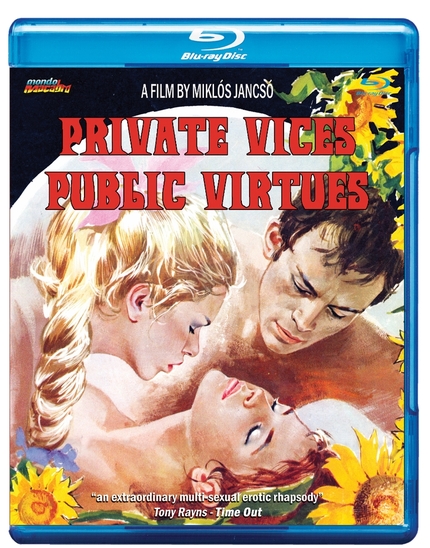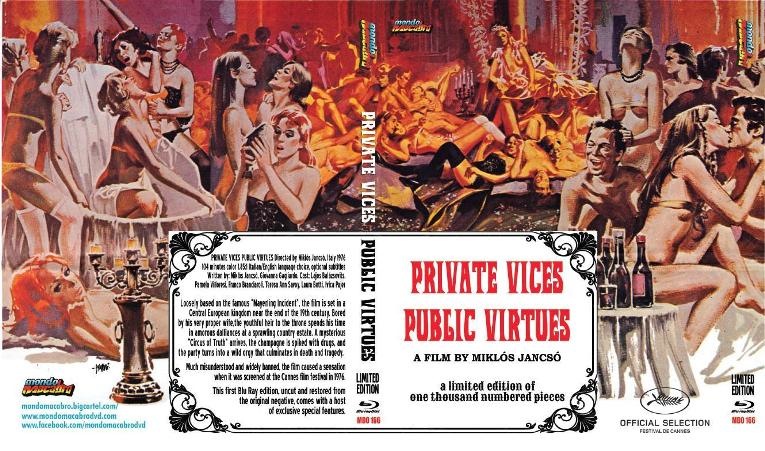Blu-ray Review: PRIVATE VICES, PUBLIC VIRTUES LE Re-examines Miklós Jancsó's Legacy

First off, let me be frank: All I know about the work of Hungarian filmmaker Miklós Jancsó I learned from this release. The name certainly rang a bell when I first heard about Private Vices, Public Virtues making its way to Blu-ray from Mondo Macabro, but it was more of a passing familiarity through years of browsing scholarly work on cinema than any kind of "a-ha" moment. So when this disc arrived in the mail, I thought it would be a great opportunity to familiarize myself with the work of a filmmaker who seems to have been revered among world cinema circles. It turns out that this is only partly the case after having spent a few hours with this release.
Private Vices, Public Virtues is the story of the Crown Prince Rudolf of the Autro Hungarian Empire and the incident which, by virtue of its infamy, would ultimately lead to the end of the Empire and the beginning of World War I. According to the story, Rudolf was not exactly an engaged participant in the kind of rigid diplomacy that held together Europe at the end of the 19th century. In fact, he actively sought to undermine his own family's power in an attempt to destabilize the people and mechanisms of power around him.
Living such an incredibly proscribed life as was required of a young man of royal blood was not in Rudolf's nature, and he in an effort to subvert that control, he attempted to challenge it at every turn. The boldest statement he made was in carrying out an illicit affair with the daughter of a diplomat, Baronness Mary Vetsera, while he was married to Princess Stephanie of Belgium, a union of political convenience. Private Vices, Public Virtues imagines an elaborate story around this affair and the mysterious circumstances that led to the deaths of Rudolf and his mistress, and it's a doozy.
Jancsó's version of the events is a salacious and frequently absurd one, but in fitting with both the rebellious spirit of Rudolf and the adventurous films of the mid-70s when the film was shot, it's done with tongue planted firmly in cheek and without regard for social mores. Jancsó imagines a spectacular orgy at the Prince's estate in which a who's who of European nobility is to be drugged and photographed participarting in this Hedonistic twisting of bodies in a way that shows the ruling class to be little more than animals waiting for the permission to rut.
As a result, the vast majority of the attendees, having been drugged, spend most of the party in various and increasing states of undress. Prince Rudolf himself (played by Lajos Balázsovits) runs around nude from the very beginning as he fornicates with everything from his mistress, to his brother, to several unfortunate bales of hay. Each member of the party is invited to submit to their baser urges in order to create the kind of scandal that Rudolf dreams of, thus condemning his family to infamy and freeing himself from the constraints of his station. However, eventually things turn sour, and his attitude becomes his undoing leaving his mistress and he dead, paving the way for the Great War.
Private Vices, Public Virtues is one of many European films of the '70s that explored the nature of the aristocracy by comparing it to an unending orgy of flesh. There was also the work of Walerian Borowczyk, in particular The Beast with its story of a fading artistocratic family seeking to regain their power through a political union, and Blanche, a similar, but less gruesome story of love. These films showed no fear of using sexuality and eroticism to stand in for the carnality of power. In a way, even Jean Rollin's work on films like The Nude Vampire and Shiver of the Vampire use the vampire mythos to represent the powerful class and their absolute dominion over the workers of the world. The irony with Private Vice, Public Virtues is that Rudolf's scheme to undermine his own privilege would've been absolutely impossible without the power his class bestowed on him, and he seems somewhat unaware of this, though he's certainly more than happy to partake of the perks.
I began this review with the statement that I don't think I know Jancsó any better now than I did before seeing this film. That's largely due to the fact that the additional content available in teh set makes it fairly clear that Private Vices, Public Virtues was an abberation in his work. Most of Jancsó's films seem to have been more clearly focused on the effects of war and/or the plight of the proletariat, however with Private Vices, Public Virtues, he turns his camera at the ruling classes and shows how their unabated abuse of power leads to a kind of tragedy. A line can certainly be drawn from one idea to the other, but this is more of an abstract connection than he seems to have become famous for. In any case, Private Vices, Public Virtues is my kind of farce, violent, sensual, and explicitly absurd.
The Disc:
Private Vices, Public Virtues comes to Blu-ray from Mondo Macabro in a brand new 2K transfer from the original camera negative. I was a bit wary of the quality in the first few moments as the opening credits rolled, but once they were over, the image smaps into crisp focus in a way that it has likely not been seen in forty years. Colors are exceptional and the image clarity is far beyond what I would've expected. The audio quality and background score are wonderful, as well. No A/V issues on this disc.
The film is presently available directly from Mondo Macabro (link below) in an exclusive limited edition variation that includes a few extras that will not be available with the eventual retail version. The limited edition disc is what I was sent to review, and it is wonderful. First of all, common to all versions are a trio of disc based extras newly produced for Mondo Macabro's release. First up is an appreciation and tour of Jancsó's filmography by Michael Brooke, an expert and evangelist of Eastern European cinema. This is roughly a half an hour of detailed discussion of Jancsó's work and legacy, it's quite interesting. This is followed up by a pair of interviews with people who worked on the film. First up is writer Giovanna Gagliardo, who discusses working with Jancsó on and off set, Gagliardo happened to be Jancsó's wife at the time. The third interview is with actress Pamela Villoresi, who describes her time on set and seems to have largely fond memories of the shoot.
The limited edition adds a couple of siginifcant extras that should be of interest to anyone who is thinking about grabbing this disc. First up, and most impressively, is a twelve page booklet containing an essay from new ScreenAnarchy contributor/former Diabolique Magazine Managing Editor Joe Yanick and former Diabolique Magazine Editor-in-Chief Max Weinberg. The essay is far reaching in terms of drawing together different threads of Jancsó's career in relation to his work on Private Vices, Public Virtues, and is well worth checking out. The other bouns that comes with this limited edition is an exclusive slipcover with different art from the regular sleeve. I'm not much of a slipcover guy, but this one is nice, and slipcover fans will enjoy it.
Private Vices, Public Virtues is an fascinating work that certainly deserves rediscovery in the same way that Borowczyk and Pasolini have gained a new audience now that time have proved their films to be classics. If you are on the fence about picking up the limited edition, be aware that the regular retail edition is still months from hitting store shelves and it will not have the booklet or slipcover. I'd head over to Mondo Macabro's online store now. I've used them several times to fill gaps in my MM collection and their shipping is reasonably priced and super fast.









